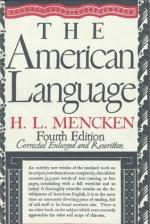
|
| Name: _________________________ | Period: ___________________ |
This quiz consists of 5 multiple choice and 5 short answer questions through Chapter 9.2 | Chapter 9.3.
Multiple Choice Questions
1. In what year did the National Education Association withdraw from the campaign for simplified spelling?
(a) 1899.
(b) 1907.
(c) 1914.
(d) 1921.
2. What language does Mencken quote Sidney Low as saying is not taught to English youth?
(a) Latin.
(b) Greek.
(c) Russian.
(d) American.
3. What American writer does Mencken claim likely inspired envy in British writers?
(a) Irving.
(b) Poe.
(c) Griswold.
(d) Fowler.
4. What is the physical basis to which the nasal twang of Americans is ascribed?
(a) Genetic diversity.
(b) The moist climate.
(c) The dry climate.
(d) Colder air.
5. What word in common honorifics did Edwin S. Gould protest against omitting in 1867?
(a) Very.
(b) Most.
(c) Right.
(d) The.
Short Answer Questions
1. What does Mencken say newspaper reporters no longer "slobber" over?
2. What spelling change is made from English to American in words such as "connection"?
3. Which of the following is a term used by philologists to indicate the "instinctive search, etymologically unsound, for short roots in long words"?
4. Which of the following groups of immigrants does Mencken claim have a profound effect on not only the American vocabulary, but also its pronunciation and idiom?
5. What word best describes the English attitude towards the adoption of foreign loan-words, in contrast to the American attitude?
|
This section contains 213 words (approx. 1 page at 300 words per page) |

|




